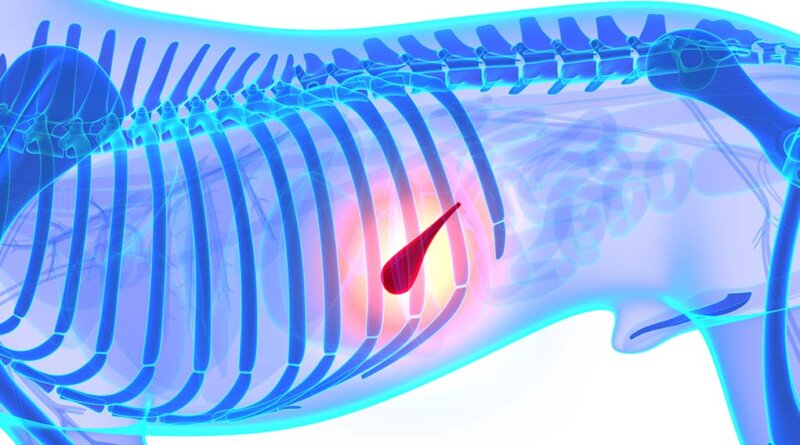4 Signs of Pancreas Problems in Dogs
The pancreas is a vital organ in a dog’s body.
It is located near the dog’s stomach, and its two main functions are exocrine and endocrine.
The exocrine part is responsible for secreting bicarbonate.
Bicarbonate buffers stomach acid, producing enzymes to digest complex carbohydrates, proteins, and triglycerides.
The endocrine is responsible for regulating blood sugar levels through insulin and glucagon hormones.
It’s not unusual for dogs to have a malfunctioning pancreas, and dog owners must be informed about possible pancreas issues and how to spot them immediately.
Below are the most common signs of pancreas problems in dogs, associated diseases, their causes, and ways to treat this health issue.
Common Symptoms of Pancreatic Symptoms in Dogs
The pancreatic symptoms in dogs can easily be mistaken for other digestive problems because most digestive issues have the same or similar symptoms.
However, there are other signs you may notice as well that may clearly indicate an issue with the dog’s pancreas.
Digestive Problems
Digestive problems and issues with a bowel movements are the most noticeable signs of a potentially unhealthy pancreas.
These include stomach pain, loss of appetite, swollen abdomen, vomiting, and diarrhea.
While these symptoms often indicate a short-term stomach issue, take your dog to the vet to check on a potential pancreas problem if they last more than a few days.
Changes in Temperature
Temperature changes are also common.
The normal temperature for dogs is between 101 to 102.5 degrees Fahrenheit.
If your pup has a fever or low body temperature, that may indicate a problem with his pancreas.
It could possibly even be pancreatitis, which is a dangerous health condition.
Breathing Problems
Your pup may have respiratory issues.
In most cases, such breathing problems usually indicate a potential problem with the dog’s lungs or airways.
However, combined with other symptoms mentioned on this list, canine breathing difficulties can signal pancreas problems.
Other Symptoms
There are several other lesser-known signs to watch out for.
Pay attention to behavioral changes your dog might exhibit, especially if he becomes lethargic and has no energy or desire to engage in his usual activities.
Your dog may also become dehydrated or experience an irregular heartbeat if he has an unhealthy pancreas.
Causes of Pancreas Problems in Dogs
While there is no definite answer to what causes dog pancreas irritation, some commonly suggested causes include old age, obesity, and high-fat diets.
The inflammation of the pancreas (pancreatitis) is the most common pancreas problem in dogs.
Oddly enough, the increase in pancreatitis cases is always evident around the holidays.
The increase can be attributed to the fact that many people share their holiday meals with their dogs and those table scraps are usually very high in fat.
Even if you don’t feed your pup a high-fat diet regularly, his pancreas can still get overwhelmed and inflamed if you give him too much fatty food at once.
According to vets, dogs that go through the garbage and eat trash are more likely to suffer from pancreatitis.
Obviously, just keep your dog from the trash both inside and outside.
Don’t leave any open or tied garbage bags on the floor.
We have our trash bin in a drawer in the kitchen. Something like this should do the trick.
Otherwise, keep an eye on your dog when you’re home, and don’t leave them home for too long.
They may get very bored and curious and knock over your trash bin. You see it all the time on social media.
The dog in the middle of what looks like a trash tornado came through your house.
Those videos are cute and funny on the surface.
However, it will take some diligent and consistent training to eliminate the habit now that they know how to get in the trash.
Endocrine conditions like hypothyroidism can also contribute to pancreas problems and severe trauma or surgery.
Some medications can predispose dogs to pancreas issues, especially anti-seizure drugs like Potassium Bromide or Phenobarbital.
Some breeds are at higher risk of having issues with their pancreas, including Miniature Schnauzers, Cocker Spaniels, Dachshunds, Yorkshire Terriers, and Poodles.
Female dogs are at a greater risk of pancreatitis than male dogs.
How to Prevent These Problems
A healthy diet and exercise play the most significant part in preventing pancreas issues, especially pancreatitis.
Feed your dog a well-balanced diet that is low in fat, stick to a regular diet schedule and feed your pup smaller, more frequent meals, if needed.
Keep the pet away from trash and table scraps.
Avoid too much starch and grains in your dog’s diet because they can be hard to digest in large amounts.
Add some supplements, like fish oil or vitamin B.
Antioxidants like vitamins C and E, selenium, and carotene can reduce the risk of pancreatitis.
Probiotics can be helpful because they increase the number of good bacteria in the pet’s intestines.
How Pancreas Problems in Dogs Are Diagnosed
Getting your pup diagnosed with any pancreas problem as soon as possible can help with the prognosis.
This is especially true regarding pancreatitis because dogs are likely to recover from mild cases without long-lasting damage to the pancreas or other organs.
However, severe cases of pancreatitis can be fatal.
If you notice any signs, bring the pet into the clinic.
Your veterinarian will run blood tests to diagnose pancreatitis.
He may also order additional tests, like abdominal X-rays or ultrasounds.
Tissue biopsies of the pancreas are sometimes taken, especially when pancreatic cancer is suspected.
Treatment of Dog Pancreas Problems
Treatment can be anything from minor adjustments in the diet and rest to something more serious in case of severe inflammation or pancreatitis.
It will all depend on the specific pancreas problem; the four most common pancreas-related health problems have specific treatments.
Pancreatitis
Pancreatitis can be acute or chronic.
Acute pancreatitis is usually more severe because the onset is immediate, and the condition can be excruciating for your pup.
Managing the pain is the first thing your vet will do, and then they will try to prevent any additional complications.
Hospitalization is often necessary in severe cases.
The treatment starts with food and water restrictions for the first 24 hours, providing rest for the pancreas and helping it recover.
If your dog is vomiting uncontrollably, he may be put on food and water restrictions for longer, usually 2-3 days.
After the hospital stay, your vet may prescribe medications to stop vomiting and help with nausea and pain pills to relieve your dog of abdominal pain.
Dogs with severe pancreatitis will be given IV fluids to prevent dehydration.
Your vet will try to discover the cause of pancreatitis and treat it.
In chronic or mild cases of pancreatitis, vets usually prescribe a low-fat diet and additional medications if needed.
Monitoring progress is necessary to avoid any complications like exocrine pancreatic insufficiency.
Exocrine Pancreatic Insufficiency
Exocrine pancreatic insufficiency (EPI) is usually caused by an irreversible loss of pancreatic tissue; this condition is incurable.
However, this problem can be managed with the supplementation of pancreatic enzymes.
Follow your vet’s instructions carefully so you don’t give too little or too much of these enzymes to your dog since it can lead to additional problems.
Pancreatic Cysts
Pancreatic cysts or pseudocysts often appear as a result of pancreatitis complications.
They are a collection of pancreatic fluid found in a wall of tissue and are treated by drawing the fluid out of them.
Surgery can sometimes be necessary if the problem persists and the cysts don’t decrease in size after a treatment period.
Pancreatic Cancer
Pancreatic cancer is often hard to detect until the condition is at advanced stages.
Hence, the prognosis for dogs with this type of cancer is usually dire.
Treatment for pancreatic cancers involves surgery, radiation therapy, chemotherapy, and some combination of these treatments.
Pancreas Problems in Dogs: Summary
Pancreas problems in dogs can vary from mild to severe, some of which endanger your dog’s life if they are not addressed on time.
Some of those cannot be cured but only managed, and some rare ones are fatal.
To reduce the chance of these issues, feed your pup a healthy, low-fat diet and exercise regularly to prevent pancreas issues.
Pay attention to the signs like weight loss, abdominal pain, vomiting, diarrhea, breathing problems, lethargy, fever, and irregular heartbeat, and your pup’s behavior changes.
Take the dog to the vet if you notice any of the symptoms.
READ NEXT: 25 Most Serious Dog Health Symptoms That Cannot Be Ignored
Related










pin up aviator: https://aviatoroyunu.pro aviator sinyal hilesi